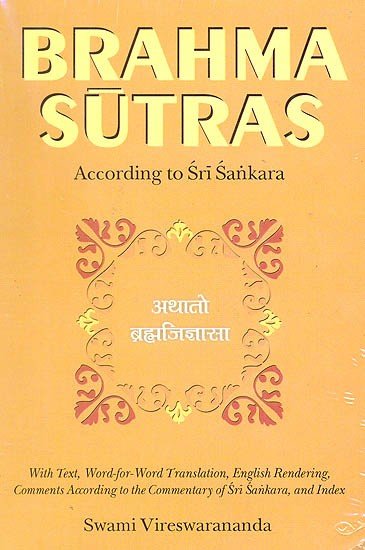Brahma Sutras (Shankara Bhashya)
by Swami Vireshwarananda | 1936 | 124,571 words | ISBN-10: 8175050063
This is the English translation of the Brahma-sutras including the commentary (Bhashya) of Shankara. The Brahma-sutra (or, Vedanta-sutra) is one of the three canonical texts of the Vedanta school of Hindu philosophy and represents an early exposition the Vedantic interpretation of the Upanishads. This edition has the original Sanskrit text, the r...
Chapter IV, Section III, Adhikarana I
Adhikarana summary: The released soul does not acquire anything new but only manifests its true nature
Sutra 4,4.1
संपद्याविर्भावः, स्वेनशब्दात् ॥ १ ॥
saṃpadyāvirbhāvaḥ, svenaśabdāt || 1 ||
saṃpadya—Having attained; āvirbhāvaḥ—there is manifestation (of its real nature); svenaśabdāt—from the word ‘own’.
1. (When the Jiva) has attained (the highest light) there is manifestation (of its real nature), as we know from the word ‘own’.
“Now this serene and happy being, after having risen from this body, and having attained the highest light, reaches its own true form” (Chh. 8. 8. 4). The opponent explains this text as follows: The individual soul which has got rid of its identification with the three bodies, viz. gross, subtle, and causal, after attaining Brahman exists in the state of Liberation. This Liberation was not a pre-existent thing, but something that is newly acquired like heaven, as the word ‘reaches’ in the text clearly shows. Therefore Liberation is something new that is acquired by the Jiva. The Sutra refutes this view and says that the word ‘own’ shows that Liberation was a pre-existent thing. The Jiva manifests its own nature, i.e. its real nature, which was so long covered with ignorance. This is its attainment of Liberation. It is nothing that is newly acquired.
Sutra 4,4.2
मुक्तः, प्रतिज्ञानात् ॥ २ ॥
muktaḥ, pratijñānāt || 2 ||
muktaḥ—Released; pratijñānāt—from the premise.
2. (The Self which manifests Its true nature attains) Liberation, (as is known), from the premise (made in the scriptures).
If Liberation is nothing new that is acquired by the Jiva, then what is its difference from bondage ? The Jiva in the state of bondage was subject to the three states of wakefulness, dream, and deep sleep, and was experiencing happiness and misery, imagining itself to be finite. On being freed from all these misconceptions it realizes its true nature, which is Absolute Bliss. This removal of all misconceptions is what is known as Liberation. Between these two states there is a world of difference. How is it known that in this state the Jiva is liberated? From the premise made in the scriptures—says the Sutra, “I will explain It to you further” (Chh 8. 9. 3; 8. 10. 4; 8. 11. 3)— here the Sruti proposes to expound that Self which is free from ad imperfections, and it begins thus: “The being without the body is not touched by pleasure and pain” (Chh. 8. 12. 1) and concludes, “Thus does this serene being rising above its body and having rearched the highest light, appear in its cwn true nature” (Chn. 8. 12. 3).
Sutra 4,4.3
आत्मा, प्रकरणात् ॥ ३ ॥
ātmā, prakaraṇāt || 3 ||
ātmā—The Supreme Self; prakaraṇāt—on account of the context.
3. (The ‘light’ attained by the Jiva is) the Supreme Self; on account of the context.
The ‘Light’ attained by the Jiva which is referred to in the Chh. 8. 3. 4 is the Supreme Self, and not any physical light, for the Self is the subject-matter which is introduced thus: “The Self which is free from evil, undecaying,” etc. (Chh. 8. 7. 1), The word ‘light’ is also used to denote the Self in texts like, “Upon that immortal Light of all lights the gods meditate as longevity” (Brih. 4. 4. 16).
